But perhaps the most amusing speech was that of the
American Minister, Mr. Motley, who told how he had been studying only that morning the example set him by the am- bassador of an important republic, who had attended a great English dinner, given on the same day of the month, seine three centuries and a half ago,—the Venetian Envoy, who on April 30, 1515, when invited to a dinner, including, as on this occasion, royal princes, great English statesmen, and the then Archbishop of York (afterwards Cardinal Wolsey), treated them before dinner to a "most copious and loving discourse" in Latin, which lasted a ,good" hour,—while after dinner his secretary played upon the flute, the organ, and the harpsichord for an hour and a half, record- ing that "he bore himself most bravely," and was listened to with profound attention. Mr. Motley deprecated all fear that he should follow in the footsteps of his Republican predecessor by bearing himself equally bravely either in the direction of exhorta- tion or music ; but his discourse was loving, if not copious, and did, to say the least, full justice to the genius of British Art. Mr. Dickens after wards modestly claimed for literature that it at least served art by rectifying the idealistic blunders of artists as to historical times, distant countries, and alien races,—correcting " unhistoric history," and dispersing fanciful dreams of " the most preposterous countries and the most impossible peoples." Appar- ently, it does that, and something more,—attests as true history what we should hastily assert to be unhistoric, and sets before our eyes images even of our own land as "a most preposterous country," and our own people as "a most impossible people," who voluntarily submitted, even before dinner, to the most incon- ceivably needless of human tortures. We may well "boast to be better than our fathers," at least in dining before the chatter begins.






























 Previous page
Previous page